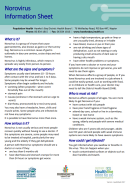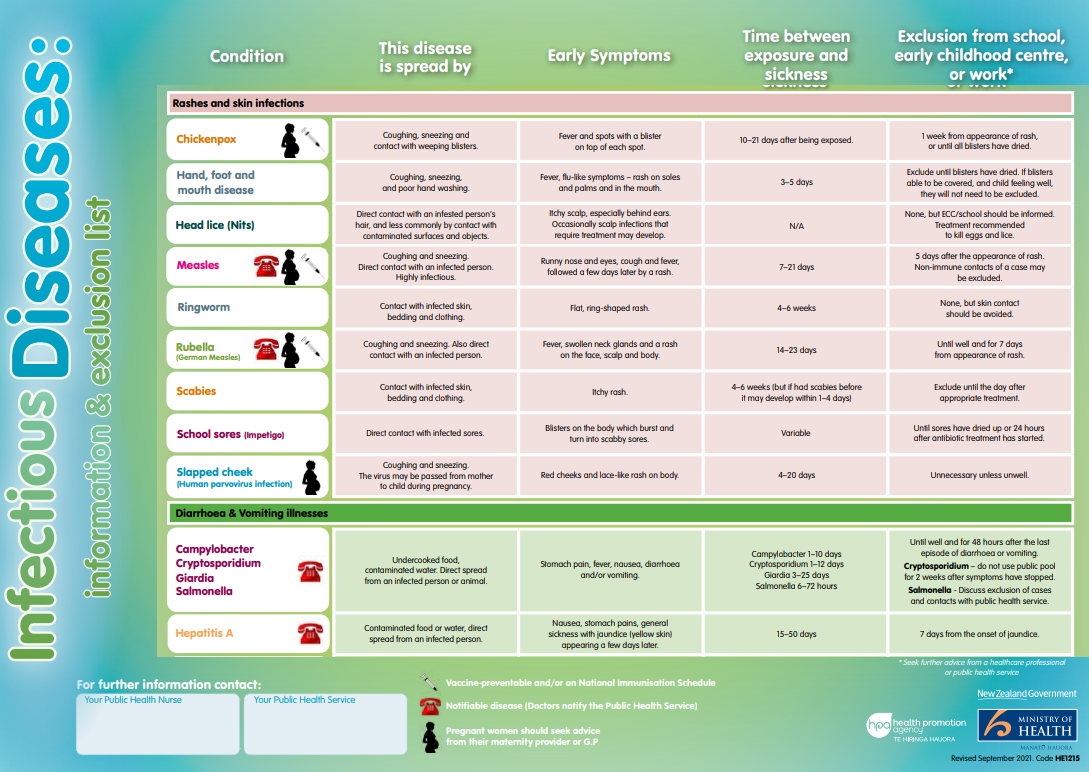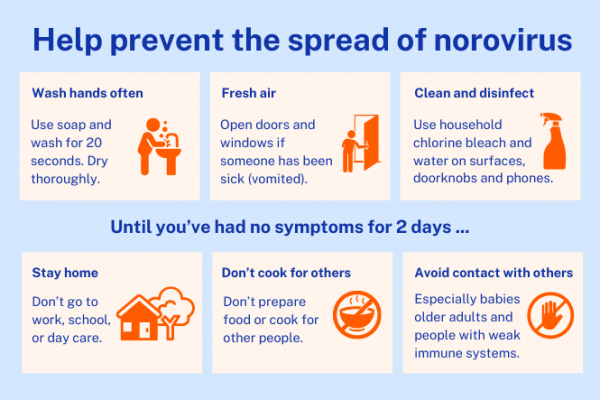Norovirus
Key points about norovirus
- Noroviruses are a group of viruses that cause gastroenteritis (gastro).
- Norovirus is very easily spread from 1 person to another and is very common in day care centres, rest homes and cruise ships.
- Symptoms include feeling or being sick, tummy pain and diarrhoea (runny poo).
- If your child is under 6 months of age and shows symptoms, get medical help.

Noroviruses are a group of viruses which cause gastroenteritis (stomach and gut infection). Norovirus is spread from someone who has the virus, as their poo and vomit are infectious. Also, norovirus can survive on surfaces and objects for weeks. It's the most common cause of gastroenteritis in adults in Aotearoa New Zealand.
Norovirus affects people of all ages. You're more likely to get norovirus if you go to day care or school or live in a dormitory, hostel or rest home. Outbreaks happen on cruise ships and in camping grounds.
You can catch norovirus by:
- having direct contact with someone who is infected
- breathing air near someone with norovirus who has just vomited (been sick)
- sharing food or eating utensils with someone who has norovirus
- eating food prepared by an infected person
- touching surfaces or objects (eg, toys) contaminated with norovirus and then touching your mouth
- eating contaminated food (eg, shellfish) or untreated water that's contaminated with norovirus. This can happen if they are polluted by human sewage (poo) – especially after heavy rain or flooding.
Symptoms of norovirus are:
- feeling or being sick (nausea or vomiting)
- tummy pain (stomach cramps)
- runny poo (diarrhoea)
Less common symptoms are:
- headache
- fever or chills
- muscle aches.
The symptoms often begin within 10 hours to 2 days of coming into contact with the virus, and usually last for 12 hours to 3 days. Some people who are infected may not have symptoms but can still pass the virus on.
Children under 6 years of age, adults 65 years of age and older, and people with weakened immune systems are more likely to have severe symptoms.
Diagnosis
Norovirus is usually diagnosed by the pattern of symptoms. It's not usually tested for as it's likely to have got better by the time the results come back. However, it is possible for your healthcare provider to send a sample of your poo to the laboratory if the cause of your diarrhoea isn't clear.
Treatment
There's no specific treatment or vaccination for norovirus. Norovirus isn't treated with antibiotics because it's caused by a virus, not a bacteria.
Most people with norovirus can be looked after at home and don't need to see a healthcare provider. Rest and drink plenty of water to prevent dehydration. Read more about dehydration in adults and dehydration in children.
Don't take medicine to stop vomiting or diarrhoea as this will stop your body getting rid of the virus. However, if you do need to see a healthcare provider and you're dehydrated they may give you medicine to stop vomiting.
When to see your doctor or nurse practitioner
|
Avoid spreading it to others
If you or your tamariki are infected with norovirus, here are some things you can do to avoid spreading it to others:
- Regularly wash your hands with soap for 20 seconds and dry them thoroughly.
- Open doors and windows to let fresh air into the room after someone has been sick (vomited).
- Use household chlorine bleach mixed with water to disinfect areas where vomit and poo have spilled, and clean surfaces and items you use often.
- Anyone with diarrhoea or vomiting should stay away from work, school or day care until 2 days after the symptoms have gone away. This is especially important for food handlers, healthcare workers, childcare workers and children at school or day care.
- If you need to visit your healthcare provider, tell the receptionist or nurse about your symptoms before you go so that the practice can use infection control measures to stop other people getting sick.
- Avoid contact with children, adults over 65 years of age and people with weak immune systems until you've had no symptoms for 48 hours (2 days).
- Don't prepare food for others until you've had no symptoms for 2 days.
- Don't go swimming in pools (or use spa pools) until you've had no symptoms for 2 weeks.
Image credit: Healthify He Puna Waiora
Careful handwashing is key to preventing the spread of norovirus.
Wash your hands with soap for 20 seconds and dry them thoroughly:
- after changing nappies
- after going to the toilet
- after caring for someone infected with the virus
- before handling or eating food.
Note that hand sanitizer does not kill norovirus.
It is also important to:
- cook all food thoroughly to kill any viruses
- only drink water that's treated and known to be safe
- boil water if you're not sure that it's safe to drink
- protect your own water supply (if you have it) from animal and bird poo and treat the water
- look for signs on the beach before gathering kaimoana (shellfish) or check the MPI shellfish alert site(external link) to see if there are any warnings in place for your area
- use household chlorine bleach mixed with water to disinfect surfaces and items that have touched poo or vomit
- avoid visiting any place that has a norovirus outbreak.
Norovirus(external link) Health New Zealand | Te Whatu Ora
Norovirus(external link) NHS, UK
Resources
Norovirus information sheet [PDF, 216 KB] Hawkes Bay Public Health Unit, NZ
Infectious diseases(external link) HealthEd, NZ
Preventing dehydration in unwell children [PDF, 192 KB] Healthify He Puna Waiora, NZ
References
- Norovirus information sheet [PDF, 216 KB] Hawkes Bay Public Health Unit, NZ, 2017
Brochures

Norovirus information sheet
Hawkes Bay Public Health Unit, NZ

HealthEd, NZ, 2023
Credits: Healthify editorial team. Healthify is brought to you by Health Navigator Charitable Trust.
Reviewed by: Dr Emma Dunning, Clinical Editor and Advisor
Last reviewed:






